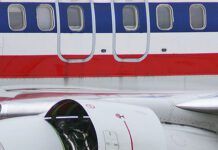Group Protests $21 Billion Deal…
It’s the U.S.’s largest exporter and by far its largest aerospace company, so when Boeing stamps its feet, the ground shakes under most of us. Lately the Chicago-based manufacturer has been attracting the attention of critics who claim Boeing is drawing too much from the government trough. The Citizens Against Government Waste (CAGW) has formally asked the House Armed Services Subcommittee to oppose a $21 billion deal for Boeing to lease 100 767 aerial tankers to the Air Force. The CAGW claims upgrading the existing fleet of 127 707-based KC-135s would cost $3.8 billion and it also points out that after leasing the 767s for 10 years the planes go back to Boeing. The company is also (according to some) seeing some extremely generous offers from states and towns as it dangles the carrot of 1,000 jobs to be won by the location that will build its new 7E7 Dreamliner. According to Baltimore Sun columnist Jay Hancock, various jurisdictions are rolling out the red carpet and the taxpayer dollars to lure the plant, with its 1,000 well-paying jobs, to their bailiwick. Hancock says Boeing denies it’s making tax concessions, loans, property and outright cash gifts conditions for locating the plant but what can it do if local politicians insist on coming up with the goods? Kansas is offering $500 million in bonds, cash-strapped Michigan and Texas are dipping into their depleted treasuries and Washington State, which is already home to most of Boeing’s business, is reportedly offering billions in incentives and has raised its gasoline tax a nickel to pay for a transportation package to appease Boeing, says Hancock.
…Help Not Always Appreciated…
But there’s apparently a limit to how much help the government can give before it actually starts to hurt business. No doubt with the best of intentions, the proposed 2004 Defense Authorization Act is laced with “buy American” provisions that some of the major defense contractors, including Boeing, say could make it harder for them to compete on the world market. The House version of the bill would require that 65 percent of every plane, bomb, truck or photocopier purchased by the Defense Department would have to be made in the U.S. That’s up from the current 50 percent. The list of products that must be 100-percent domestically produced would be expanded to include items such as ready-to-eat meals, tires and bomb fuses. Defense contractors are afraid the provisions will prompt similar protectionist moves in other countries, making it tougher for them to compete there. There’s also a concern that the bill could threaten the Joint Strike Fighter program, which is a multinational effort and would incorporate equipment and technology from several European countries. Rep. Duncan Hunter (R-Calif.) dismissed those concerns, telling The Washington Post he doesn’t believe the JSF program is threatened by the bill. “Other countries just have to understand … We have to do everything we can to protect our defense industrial base. That is a legitimate national interest for this country.” He told the Post the U.S. defense industry has become too dependent on foreign components, some of whom withheld shipments to protest the war in Iraq.
…And The Marketplace Decides
On the battlefield that the commercial airliner market has become, Boeing notched two significant victories earlier this month. The company sold 45 737s to All Nippon Airways and inked a deal with AirTran Airways for 50 Boeing 737s and another 10 717s, worth a reported $4 billion. The sales came after Airbus beat Boeing, which has dominated the budget airlines, for contracts with JetBlue and easyJet. AirTran’s CEO said his deal could have gone either way because Airbus’s bid was neck and neck with Boeing’s. According to an Associated Press story, a week before the AirTran contract was signed, Boeing’s financial arm exercised options to buy more than a million shares of stock in AirTran. On June 24, Boeing Capital Corp. converted about $5.5 million owed by AirTran into stock for $5.42 a share, which was a little more than half the market price of $9.42 per share. AirTran borrowed money from Boeing in April of 2001 to refinance debt. Boeing had already converted $12 million worth of debt to shares in an earlier transaction and still has another $13.5 million that it could convert. Boeing Capital spokesman Russ Young told The Seattle Times the June 24 transaction had nothing to do with the sale to AirTran.


































